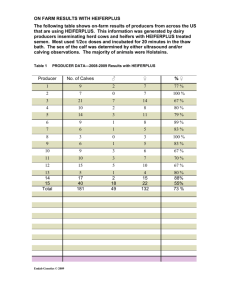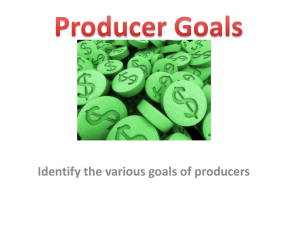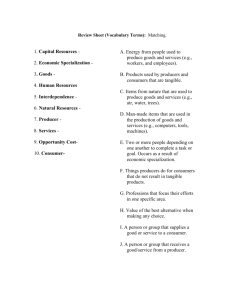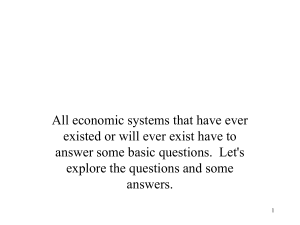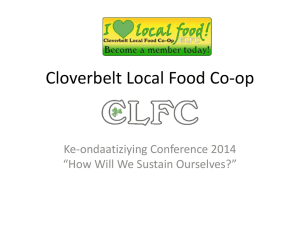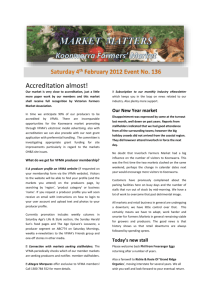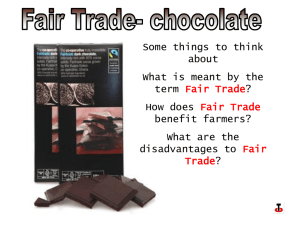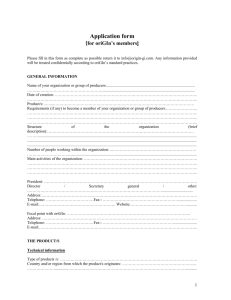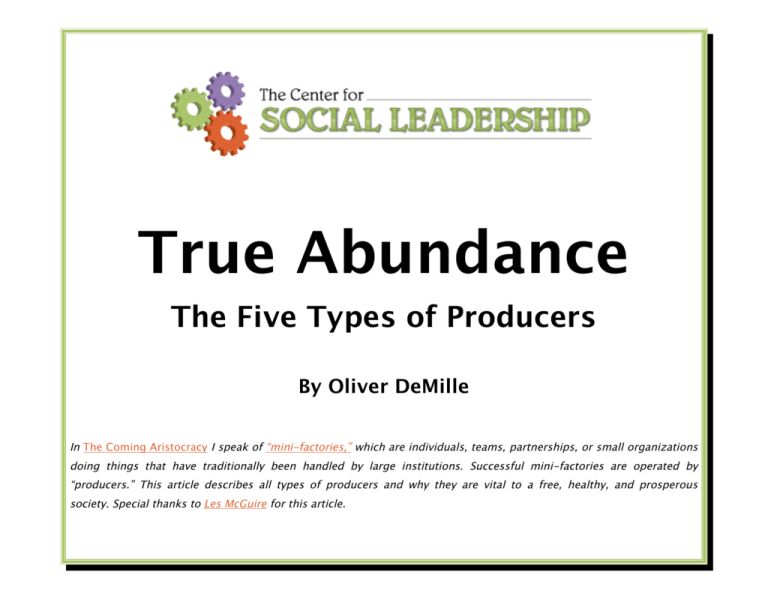
True Abundance
The Five Types of Producers
By Oliver DeMille
In The Coming Aristocracy I speak of “mini-factories,” which are individuals, teams, partnerships, or small organizations
doing things that have traditionally been handled by large institutions. Successful mini-factories are operated by
“producers.” This article describes all types of producers and why they are vital to a free, healthy, and prosperous
society. Special thanks to Les McGuire for this article.
Please Distribute This Document Freely
Provided that the content and links are left intact, as is, without editing, and that
proper credit and attributions are made to The Center for Social Leadership.
Copyright Notice
© Copyright 2009 by The Center for Social Leadership. All rights reserved. No part of this publication may be reproduced or
transmitted in any form or by any means, electronic or mechanical. Any unauthorized use, sharing, reproduction, or distribution of
parts herein is strictly prohibited. You may and are encouraged, however, to freely distribute this document as a whole, without any
changes or editing, or reprint its content as long as the links are left intact, and proper credit and attribution are included.
Legal Notice
The information contained in this document is not intended as advice, legal, medical, financial, or otherwise, and is provided for
educational purposes only. You are highly encouraged to seek the advice of a competent professional when applicable. The reader of
this document assumes all responsibility and liability for the use of these materials and information. The Center for Social
Leadership assumes no responsibility or liability whatsoever on behalf of the reader of these materials.
True Abundance: The 5 Types of Producers
2
Contents
Introduction_____________________________________________________________________________________________ 4
Type 1: Prophets, Sages, Philosophers __________________________________________________________________ 6
Type 2: Statesmen_______________________________________________________________________________________ 8
Types 3 & 4: Investors & Entrepreneurs ________________________________________________________________ 11
An American, a Frenchman, & a Russian _______________________________________________________________________ 12
The Employee v. Owner Mindsets _____________________________________________________________________________ 14
Type 5: Intrapreneurs __________________________________________________________________________________ 17
The Synergy of Created Value __________________________________________________________________________ 19
Overcoming 3 Crucial Mistakes ________________________________________________________________________ 22
Producer Mistake #1: The Generation Gap _____________________________________________________________________ 22
Producer Mistake #2: The Blinders ____________________________________________________________________________ 24
Producer Mistake #3: Arrogance_______________________________________________________________________________ 26
Engage With CSL _______________________________________________________________________________________ 27
True Abundance: The 5 Types of Producers
3
Introduction
Prosperity and abundance in a society depend on a certain type of person: the
producer. Societies with few producers stagnate and decay, while nations with
a large number of producers vibrantly grow — in wealth, freedom, power,
influence and the pursuit of happiness.
Producers think in abundance rather than scarcity, take initiative instead of
waiting for someone else to provide them with opportunity, and faithfully take
wise risks instead of fearfully believing that they can’t make a difference.
In contrast, non-producers provide very little leadership in society and cause
more than a majority of the problems. In history, as Jefferson put it,
producers are the most valuable citizens.
Of course, he was speaking directly of farmers, but the principle applies to all those who add significant value
to society. Non-producers consume the value that is added to society, but they create little value.
True Abundance: The 5 Types of Producers
4
But who are the producers? Fortune 500 executives include themselves in this category, and so do small
business owners in their first month of operation. Successful investors call themselves producers, as do
unsuccessful day traders who claim that they just “haven’t had their lucky break yet.”
Clearly, just calling yourself a producer doesn’t make you one.
In fact, there are at least five types of producers, and each type is vital to a successful civilization. Each of the
five creates incredible value, though the currency of the value is not always identical. Without any of the five
types, no society succeeds and grows. When all five are creating sufficient value, no society has ever failed.
Producers are needed — all five kinds of them. These are the following:
•
Prophets, Sages, Philosophers
•
Statesmen
•
Investors
•
Entrepreneurs
•
Intrapreneurs
True Abundance: The 5 Types of Producers
5
Type 1: Prophets, Sages, Philosophers
The highest level of value creation comes from prophets, sages, and philosophers.
This category of producers is not limited to the Biblical-type prophets who spoke
directly with God, but also includes anyone who teaches true principles. This
makes these producers the most important type, because without clearly
understood principles all the other types of producers fail.
Indeed, the other producers succeed to the exact extent that they understand and
apply true principles.
Prophet-producers include Moses and Paul, who share God’s wisdom with us, and
also sages like Socrates or Confucius or Bastiat, gurus like Edward Deming or Peter Drucker, philosophers like
Buckminster Fuller or Stephen R. Covey, and those who inspire us to serve like Billy Graham or Mother Teresa.
Whether you agree or disagree with these people, their wisdom causes you to think, ponder, consider, and
ultimately understand truth. By applying these truths, a person is able to produce.
True Abundance: The 5 Types of Producers
6
Even if you just sit and ponder, letting the truths come to your mind through deep thought or hard
experience, true principles are still passed to you through spiritual or creative means.
God is the greatest producer in the universe, and He shares true principles with us so we can also produce. For
value to be created, true principles must be applied.
Ironically, because God, prophets, and other wise people often share their wisdom without asking for
monetary compensation, sometimes other types of producers discount the value of their contribution. But
make no mistake: revealing and teaching true principles is the highest level of creating value.
Whether we learn principles through inspiration or intuition, or from the lessons gained through hard work
and experience, without principles we cannot produce. Parents and grandparents are among the most
important producers, because they teach principles most effectively — or not. When they don’t, the whole
society suffers.
True Abundance: The 5 Types of Producers
7
Type 2: Statesmen
The next type of creating value comes from statesmen.
Do not confuse statesmen with politicians and bureaucrats, who are often worse than non-producers because
they actually engage in anti-producing.
In contrast, statesmen create the value of freedom in society.
The level of freedom in any nation is a direct result of the
actions of statesmen — past and present.
If great statesmen like Cato, Washington, Jefferson, Gandhi,
or Churchill are present, a nation will throw off its enslaved
past and adopt new forms and structures which ensure
freedom of religion, freedom of choice and action, freedom
of property and commerce, and other freedoms.
True Abundance: The 5 Types of Producers
8
Together the value created can be called life, liberty, and the pursuit of happiness. Take these freedoms away,
and entrepreneurship and investment fade and disappear. There are no exceptions in history to this pattern.
Statesmen keep a nation from rejecting its freedoms and moving back into a cycle of tyranny and anarchy,
where little production of any kind occurs.
In short, without principles there is little freedom, and without freedom all other kinds of production
shut down, are regulated out of existence, and cease to be viable options. No matter how entrepreneurial
your spirit, you would not have created much value in the economy of Nero’s Rome, Russia under Stalin, or
even Boston under the Stamp Act.
Without freedom, only prophets survive as producers — all other types of producers need both principles and
freedom to flourish. The greater the understanding of principles and the freedom of the society, the greater
the opportunities for producers.
Indeed, almost nothing creates more value than increasing freedom.
Only when freedom is widespread would the other types of producers have the peace to think that statesmen
don’t add value. And frankly, when freedom is widespread is the very moment that it is in the most danger of
being lost — it is at such times that statesmen are the most valuable producers.
True Abundance: The 5 Types of Producers
9
Of course, the well-known statesmen like Lincoln or Jefferson only appear on the scene when there are a lot of
lesser-known individuals studying, writing about, talking about, and promoting statesmanship. Only
generations with lots of statesmen produce true freedom that allows widespread educational and economic
opportunity.
Most of the history of the world shows the absence of such statesmanship, so most of the population of the
world were serfs, peasants, slaves, and other non-producers. Yet it is the true nature of all mankind to be
producers, leaders, nobles.
Jefferson called this the “natural aristocracy,” and it happens only in those rare pockets of history where
statesmen create and perpetuate freedom. Next to true principles taught by prophets, sages, and
philosophers, freedom is the highest value that one can add to any society.
True Abundance: The 5 Types of Producers
10
Types 3 & 4: Investors & Entrepreneurs
The third type of producer is the investor, and the fourth type is the entrepreneur.
This needs little commentary among producers, who nearly all realize that entrepreneurship is necessary to
create new economic value and that even the best entrepreneurial ideas and leaders can fail without adequate
capitalization.
Robert Kiyosaki lists investors as the highest of his cash flow
quadrants and business owners, or entrepreneurs, next. He is right
on. Without investors, many, if not most, entrepreneurs would fail.
Without both “I’s” and “B’s,” to use Kiyosaki’s language, no society
can make significant or sustained progress.
Moreover, without investment and entrepreneurship many of the
principles taught by prophets and most of the freedoms vouchsafed
by statesmen would go unused — and eventually be lost.
True Abundance: The 5 Types of Producers
11
Prophets, sages, philosophers, and statesmen are dependent on investors and entrepreneurs, and vice versa.
As I said, no society is really successful unless all five types of producers effectively create value in their
unique but interconnected ways.
Part of the value created by investors and entrepreneurs is obvious: They provide capital and establish
institutions which build society. Every family and every individual benefits from their services.
Perhaps less known, but just as important, investors add the vital value of experience. Kiyosaki and Buffet
both affirm that without personal knowledge and significant experience in a business, almost everyone who
tries their hand at investing fails.
A society without adequate investment and entrepreneurship will see little, if any, progress.
An American, a Frenchman, & a Russian
The old joke is told of an American, a Frenchman, and a Russian, lost in the wilderness, who find a lamp and
rub it. Out comes a genie. He offers them each one wish, for a total of three.
True Abundance: The 5 Types of Producers
12
The American pictures the large ranch owned by the richest people in the valley where he grew up, and wishes
for a ranch ten times its size, with flowing streams and meadows full of horses and cattle. His wish is granted
and he is transported home to his new life.
The Frenchman pictures the farm and cattle of the largest estate from his home province, and pictures one
just like it. Again, his wish is granted.
Finally, the Russian pictures the land and herds of the rich family in the steppes where he grew up, and wishes
that a drought kill the cattle, dry up the grass, and bankrupt the aristocratic family.
The joke isn’t really very funny, though it brings big laughs with audiences of producers. They get it.
The Frenchman, thinking like an entrepreneur, wants the good things that life provides, and is willing to go to
work to produce them. The American, who thinks like an entrepreneur and an investor, is willing to go to work
also, but wants to see his assets create more value. The Frenchman wants value, the American plans for value,
increased market share and perpetual growth.
In contrast, the Russian in this parable can only think of one thing — getting even with those who seem to
have more than him.
True Abundance: The 5 Types of Producers
13
This is the same as Steve Farber’s lament about the sad state of our modern employee mentality — where
“burn your boss” is a slogan of millions of workers who see their employer as the enemy.
The Employee v. Owner Mindsets
Initiative, vision, effective planning, the wise use of risk, quality execution — all are the contributions of
entrepreneurs and investors. Without them, any society will decline and fall.
Yet the non-producer mentality is often deeply ingrained in most people. For example, a visiting speaker at
George Wythe University once told the student body of how challenging it was to get his employees out of
their “serf” mentality.
As the founder of a growing manufacturing technology company, he pulled in all his two dozen employ ees
and offered them liberal stock options. He explained that if the company met its projections, they would all be
very wealthy — and he abundantly wanted to share the prosperity.
Yet only a few of them would take the options. They only wanted cash salary, and mistrusted the whole
concept of stock ownership.
True Abundance: The 5 Types of Producers
14
At first he just offered it, thinking they’d all jump on board. But when only a few did, he pulled them in one by
one and tried to make the case for stock. Still, only a few more took the stock.
The company grew, expanded, and then its value soared. Suddenly, one month
a half dozen of the company’s employees were independently wealthy. They
met, made plans, some stayed with the company and others moved on.
But the real story happened with the eighteen who had refused the stock. They
were still paycheck-to-paycheck employees. And they were very angry! Most of
them met with the founder in his office, and many of the meetings ended with
yelling, names called, and doors slammed.
The entrepreneur couldn’t believe it. NOW these employees wanted their
millions. But it just doesn’t work that way. “I begged you to take the stock,” the
owner told them. “Now, I can’t help you. Why didn’t you take it when I offered?”
he asked.
They had no answer. Only that: “I worked as hard as Jim and Lori, so why can’t I get the same payment?”
True Abundance: The 5 Types of Producers
15
Entrepreneurs and investors understand that work is very, very important, but that high levels of
compensation come to those who create value. Like the Russian in the joke above, this man’s employees felt
they had been “ill-used.”
Consider the impact of this scarcity mentality on any society that adopts it. Freedom is naturally lost, and
prosperity slows down and eventually becomes poverty. Entrepreneurs and investors are essential to societal
success.
True Abundance: The 5 Types of Producers
16
Type 5: Intrapreneurs
The fifth type of producer is the intrapreneur.
In a free society, investment capital is plentiful — but only effective
entrepreneurs and intrapreneurs can turn capital into increased
value. This takes initiative, wise risk and leadership, just like the
other types of producing.
While entrepreneurs found or own businesses, intrapreneurs work
for and lead established businesses — but unlike traditional
employees, intrapreneurs lead with the Producer mindset. They run
their department, team, or company with an abundance mentality, an attachment to true principles, and a
fearless faith in people and quality.
Intrapreneurs don’t really have jobs even though they are usually W-2 employees. Like entrepreneurs,
intrapreneurs consider themselves on a mission to help society, to give it what it needs and wants, to truly
serve others.
True Abundance: The 5 Types of Producers
17
Like all producers, they believe in a deep accountability, refuse to assign blame, don’t believe in failure, and
give their heart and soul to serve the customer. They add huge value in financial terms, leadership, and
relationships — sometimes with people they’ve never met. They pour quality into everything they do, and
thereby deeply serve all who benefit from their product or service.
Great entrepreneurs and intrapreneurs have a deep faith in the market, as long as it doesn’t go against true
principles or subvert freedom.
Without the initiative and risk of entrepreneurship, few intrapreneurs would have a place to work and serve;
likewise, without intrapreneurs there would be few successful companies. Indeed, it is hard to imagine that
there would be any.
True Abundance: The 5 Types of Producers
18
The Synergy of Created Value
For any company to succeed, all five types of producers must fulfill their unique roles. This is even more true
for any nation.
Producer Type Currency
Prophet/Philosopher
Principles
Statesman
Freedom
Investor
Capital
Entrepreneur
Prosperity
Intrapreneur
Quality
To see how vital all five types of producers are, consider the past. Major world powers in history have failed in
the same way. First, the people stop giving heed to the wisdom of the prophets. Second, voters or those in
True Abundance: The 5 Types of Producers
19
power replace statesmen with politicians, whereupon freedom steadily decreases. Third, the natural result is
increased regulations and taxation, ridiculous lawsuits and judicial decrees, and governmental policies that
discourage and then attack producers, initiative, and the abundance mentality in general. Fourth, investment
capital flees the nation to follow the Rule of Capital — it goes where it is treated well.
Finally, the people have a scarcity mentality, refuse to listen to
the prophets or elect statesmen, and entrepreneurs go where
investment gives them opportunity. The nation stagnates and
declines.
Egypt, Israel, Greece, Rome, Spain, Italy, Bismark’s Germany, and
Han China all followed this pattern. Each was a major center of
world power, influence and prosperity, and each declined into a
third world nation. France copied this pattern in the 1800s, Britain followed it in the 1900s, and the United
States is on an identical track today.
Specifically, the U.S. is at the point where it is increasing its regulation, experiencing absurd lawsuits and court
decisions, and increasingly adopting policies that discourage entrepreneurship. The next step is to openly
attack investment and entrepreneurship.
True Abundance: The 5 Types of Producers
20
And when investors find higher profits in other nations, while facing decreasing returns along with public
hostility and rising taxes at home, U.S. investment will dry up. History is clear on this point. There are no
exceptions.
The only hope is for a new generation of producers to effectively promote freedom. In fact, the U.S. has been
at this point twice before — in 1860 and again in 1939. Both times enough statesmen arose, most of them
unknown to all except avid readers of history, to push aside the politicians and save our freedoms. Britain saw
the same thing happen in 1216, 1620, 1815 and 1937.
Other nations have followed a similar pattern. When the people listen to the prophets, statesmen promote
freedom, and investors and entrepreneurs/intrepreneurs build the nation.
When the sages are ignored and statesmanship is seen as abstract and worthless, investors go elsewhere —
capital flees to other nations, and the home country declines. With such decline comes moral decay, the loss of
political and economic freedom, and the end of opportunity.
Abundance is a true principle, yet through history most governments have made it their major goal to crush
abundance and prosperity in the masses and give it to the aristocracy or royalty. Anyone who thinks this can’t
happen in America hasn’t closely studied history.
True Abundance: The 5 Types of Producers
21
Overcoming 3 Crucial Mistakes
Many producers make three predictable mistakes. Any producer who knows these mistakes and avoids them
will be a better producer and create more lasting value in society.
Producer Mistake #1: The Generation Gap
First, producers seldom encourage their own children to follow the producer path.
Many young producers will disavow this, arguing that they’ll do all within their power
to teach the abundance mindset to their children.
And most of them do, until the children start to get close to adulthood. At this point,
many producers realize just how hard the producer role is in life and seek to help
their children avoid the pain and challenge of this path.
Many producers recommend that their children become professionals — doctors,
lawyers, accountants, engineers. It is ironic how many very successful college-drop-
True Abundance: The 5 Types of Producers
22
out producers make sure that all of their children attend the most prestigious colleges available and major in
the normal career fields.
Even the producers who train their oldest child to follow in their path often send the younger children in other
directions. And hardly any producers pass along the producer mindset to their grandchildren.
Of course, if children or grandchildren choose to take a different path in life, it is usually wise to support their
decisions and love them unconditionally. But training them in social leadership, abundance, creating value,
serving society, and the producer mindset is good for them no matter what path they take in life.
The historically effective solution for this is for producers to put real time, thought, planning and execution
into their grandparenting role — long before they are grandparents. Quality grandparenting is a way for all
producers to engage the prophet role for their family, to help pass on their wisdom and understanding of true
principles to future generations.
Great parenting fulfills this same function, and is part of propheting — the highest level of production.
True Abundance: The 5 Types of Producers
23
Producer Mistake #2: The Blinders
The second mistake many producers make is to think that their particular brand of producing is the only one
that creates real value.
Like the old parable of the carpenter who believes that all of the world’s ills can be fixed with a hammer,
sometimes producers get so focused on their type of producing that they narrowly discount the value of the
others. Focus is good, but narrow thinking usually limits one’s effectiveness.
For example, a statesman who believes that changing government is the only real answer to society and that
freedom will fix all problems, will likely reject the moral teachings of prophets and consider them mere
“philosophy.” Such a person limits his statesmanship because he just doesn’t get it.
So does the statesman who thinks freedom is the only goal, and that entrepreneurs are just in love with money
— he will likely try to use law against entrepreneurship, which is the opposite of statesmanship.
A true statesman sees that all five types of producers are vital to society. Similarly, when prophets undervalue
statesmen, freedom of religion and independent thinking are often lost.
True Abundance: The 5 Types of Producers
24
Likewise, an entrepreneur who discounts the teachings of prophets may feel successful because he’s made a
fortune selling pornography. “After all, I just gave the market what it
wanted,” he says.
No abundance-minded entrepreneur would think this, because value is only
created when principles and freedom aren’t attacked. If economic value
reduces moral or freedom values, total value is actually decreased.
Or, consider the entrepreneur who thinks building profitable businesses is
the only way to create value and therefore does little to promote
statesmanship — in his older and wiser years he will likely regret the regulated and declining world which he
sees his grandchildren inheriting.
When entrepreneurs undervalue statesmen, politicians and bureaucrats win the day and capital is discouraged
and eventually attacked. The wise entrepreneur or investor will see the great value added by prophets and
statesmen, and he will create more value in his life because his broader view will help him make better
decisions.
True Abundance: The 5 Types of Producers
25
The examples could go on, but suffice it to say that significant problems occur when any of the five devalue
any of the others. However, when all five types of producers understand, highly value, and actively support
each other, all types of producers experience synergy — and the value created is exponentially increased.
Producer Mistake #3: Arrogance
Finally, the third common mistake made by producers is to look down on non-producers.
One of the true principles taught by prophets is that every person is inherently as valuable as any other. True
abundance means that we respect people, whatever their chosen path — as long as it is good and honorable.
Producers, all five types, are truly vital to society, but that doesn’t make producers any better than anyone
else. In fact, true abundance producers know that every person is a genius. Every single person. Some decide
not to develop it much, but everyone is a genius. And producing is really just about getting people to develop
that genius.
Producers who understand this point are the most effective, because they do it all for the right reasons — a
true love of and desire to serve others. This is what abundance really means. Everything else falls short.
True Abundance: The 5 Types of Producers
26
This is true abundance, so abundant that you spend your life voluntarily serving others (in contrast, true
scarcity would be to spend your life on yourself). Real value means people value — and creating value really
means helping people choose better lives. This is what all five types of producing are all about.
To learn more about the role of producers in society, see The Coming Aristocracy by
Oliver DeMille.
Engage With CSL
•
Join the CSL mailing list.
•
Read our free e-book, Social Leadership: A Fresh Vision for Old Problems.
•
Subscribe to our RSS feed or have new articles emailed to you.
•
Join CSL on Facebook.
•
Follow CSL on Twitter.
•
Enjoy our YouTube videos.
True Abundance: The 5 Types of Producers
27

